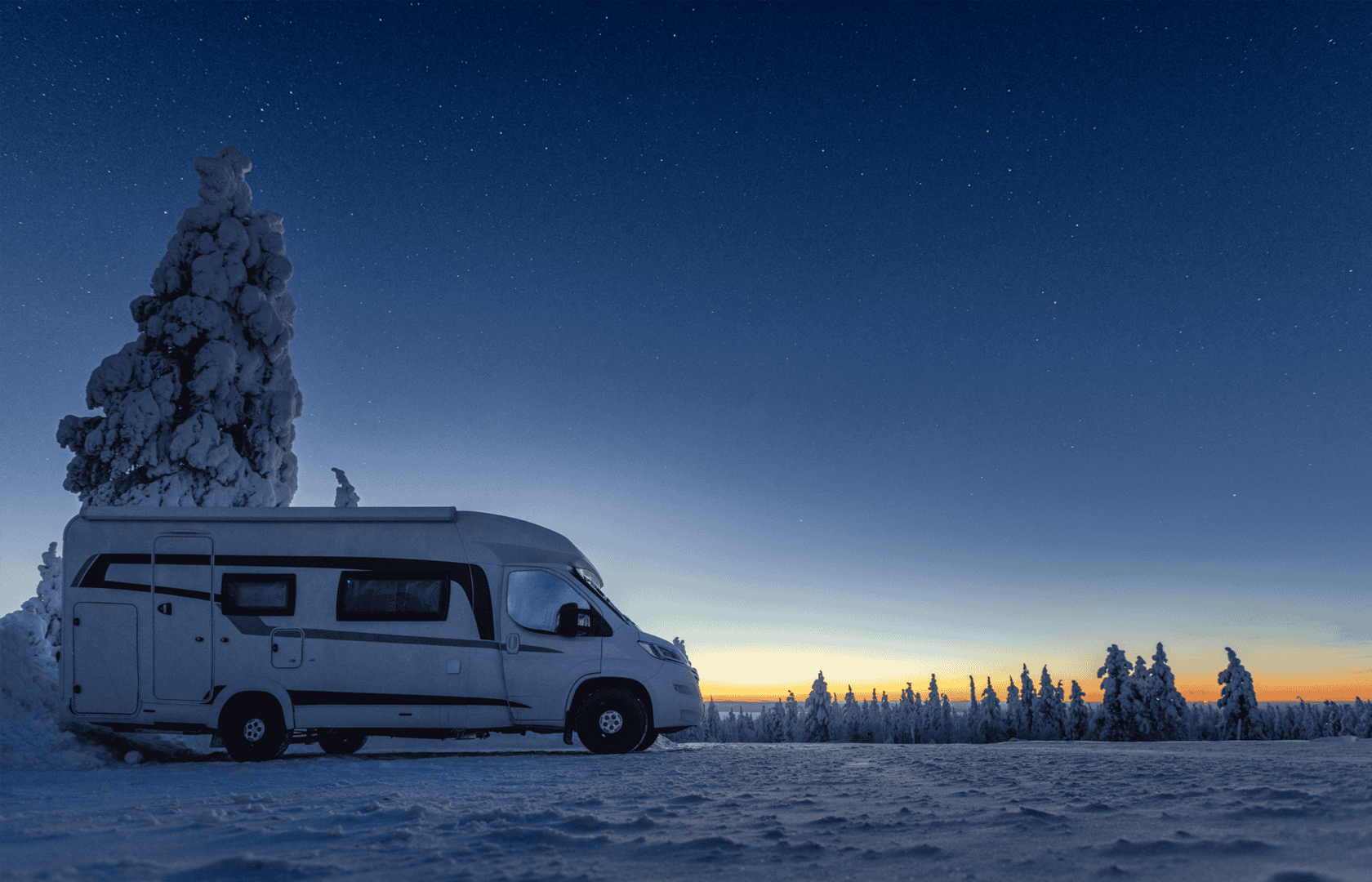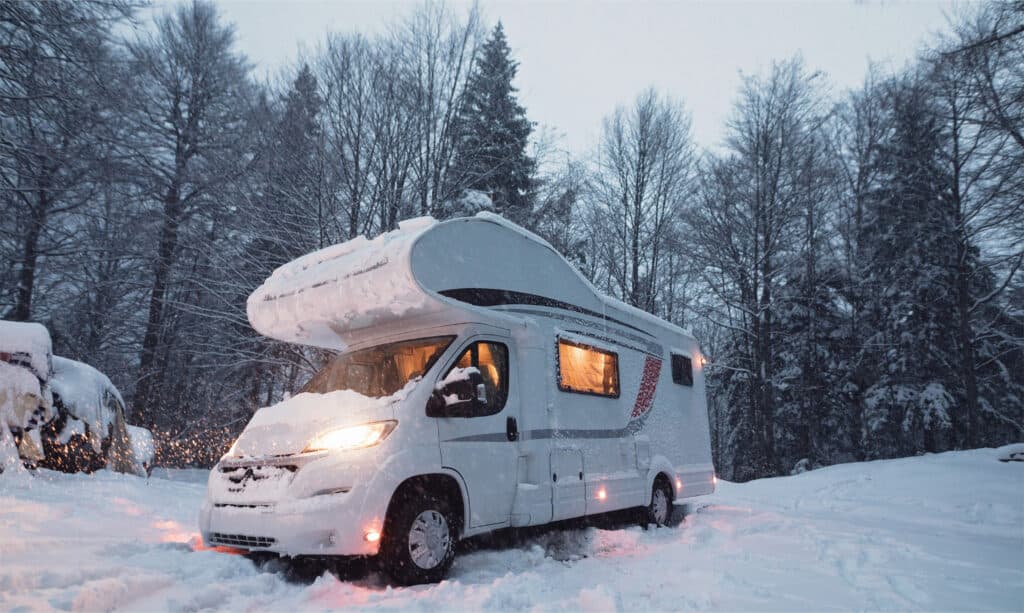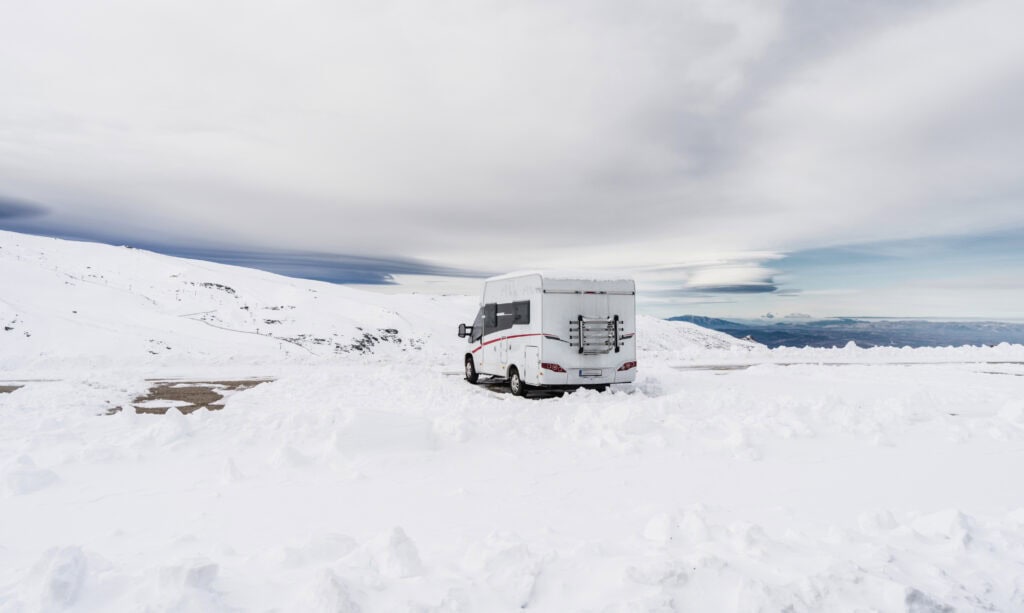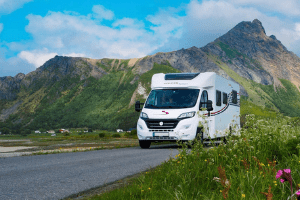Over the autumn we posted handy motorhome and campervan winterisation tips across our Facebook, Instagram, and X (Twitter) accounts. In case you missed them we’ve compiled all the content from our social media platform into one handy guide so you can be fully prepared for the winter ahead!
Inside your Motorhome/Campervan
Silver Screen
A silver screen applied to the windscreen and windows of your motorhome/campervan is designed to keep the heat in during cold weather and reflect sunlight to maintain a cool temperature during the summer. Its primary function, however, is to lower condensation, preventing water from forming on one of the main glass panes in your motorhome/campervan.
Winter storage heaters
A storage heater will prevent the motorhome/campervan from becoming too cold. There are different types available, including gas, petrol and diesel motorhome heaters.
Curtains
Fitting a curtain to separate the cab area at the front of your vehicle from the rest of the living space is a great way to keep your motorhome or campervan warm. A lot of the cold air comes from the front windows, so blocking this off will allow what heat you do have to stay within a confined zone.
Bedding, sleeping bags, blankets, and throws
It goes without saying that a thick high-quality, high tog rated duvet or thick winter sleeping bags will be worth taking on your winter break.
Packing a few warm blankets or throws may also come in handy for that extra element of warmth, as will a mattress topper suitably designed to fit motorhomes or campervans. Choose the right combination of bedding and you’ll be as warm as toast throughout the night and will wake up feeling refreshed and raring to go.
Storing bedding
The colder weather can have an effect on fabrics. To keep bedding and blankets safe it’s important to properly store bedding when it’s not in use. Place the bedding in compression or vacuum storage bags. These will remove the air inside, reducing the chance of dampness forming. From there, you could place these bags into a trunk or cupboard with a good-quality seal. This can then be stored inside the motorhome/campervan.
Carpet and small rugs
Motorhome and campervan flooring comes in various finishes. Many owners choose vinyl floor covering, or a similar material because it’s easy to keep clean. In winter however, easy to wash floor coverings can become cool under foot. To make your motorhome more comfortable in winter you may like to consider fitting carpet or carpet tiles which also add an extra layer of insulation.
If you’ve already got carpet, adding a rug or two gives even more warmth and comfort to the interior of your motorhome/campervan. Specialist rugs are available, but if you’re looking for a more cost-effective option, bedside rugs can be picked up cheaply in many high-street shops as well as online. Consider buying rugs that are machine washable, particularly if you’re travelling with pets that are likely to leave muddy pawprints behind.
Keeping away unwanted guests and pests
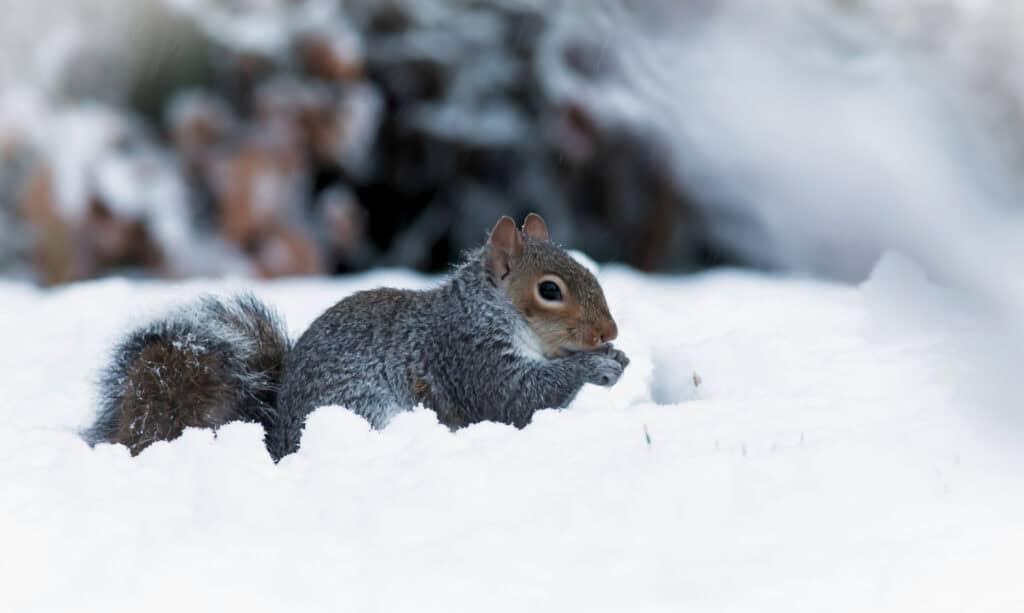
Unwanted guests such as rats, mice and squirrels can become a real issue as the weather changes. These rodents are looking for shelter from the cold, so winterising your motorhome or campervan should include some pest control:
- Set traps: Placing traps in key areas, such as under sinks and near food cupboards, could be a good preventative measure – especially in months when you might be less likely to use your motorhome/campervan.
- Protect wires: Apply insulation tape or use a spray to keep vermin from nibbling your wiring.
- Use peppermint oil: If you’d like to use a humane deterrent, peppermint oil is said to repel rodents. Soak some sponges and place them around the motorhome.
- High frequency animal deterrent devices: Another great way to deter wildlife from disturbing your vehicle when you’re parked up is by buying a high-frequency animal deterrent device. These devices are battery and solar operated you don’t have to worry about powering them from your vehicle or an external battery and emit a high frequency sound that will keep any unwanted animal intruders away from your motorhome/campervan.
Check common nesting areas
Areas such as vents, the engine, and exhaust pipes are common nesting areas for small birds and rodents. It’s vital to check these areas before driving or turning on certain electricals like fridges, as if these areas are blocked it could be a potential fire hazard. For best measure shine a light into ducts, vents and pipes to ensure they are clear from pests and aren’t blocked by any nesting materials.
Ensure all foods are properly stored away and not left out to make sure animals are not enticed to your vehicle. Metal storage boxes are the best option for avoiding pests as rodents aren’t able to chew through them.
Metal Mesh covers
Plastic mesh vent covers are commonly used in motorhome and campervans however, they are easily chewed through by rodents. A solution to this problem is to use metal mesh vents that the rodents are unable to penetrate to avoid them nesting in your vehicle.
What to do if a bird is nesting in your vehicle?
In the event that you find a bird nesting in your vehicle it is vital not to take any action without consulting and receiving guidance from a wildlife specialist like the RSPCA first.
The Wildlife and Countryside Act 1981 states that all wild birds, their nests and eggs are protected. It’s an offence to intentionally disturb certain species of bird while they’re nesting.
The Exterior of your Motorhome/Campervan
Thermal Screen cover
Modern motorhomes have vast expanses of glass in the windscreen. This is fantastic for providing panoramic views of your surroundings, but glass itself is not the best insulator. Once parked up, fitting external screens can significantly help reduce heat loss from the windscreen, driver, and front passenger windows. Combined with adequate ventilation, external screens are also a good way to help prevent condensation from forming on the inside of your windscreen.
The covers can be fitted quickly and typically attach to your motorhome/campervan around the wingmirrors using velcro. Some covers come with suction pads too. Not only do thermal screens help to protect you from the elements, helping to keep you warm and cosy, but they’ll also help you save some money too on the running costs of your motorhome or campervan heating system.
Draught skirts
These are designed to help prevent the circulation of air underneath your vehicle. A constant circulation of wind and air has a cooling effect on the habitation area temperature. If you’re a regular winter motorhome /campervan traveller it’s worth investing in a high-quality draught skirt. Attaching along the bottom section of the motorhome or campervan the skirt hangs between the vehicle and the ground. They can be pegged into place to stop them from lifting and letting in any strong drafts.
Winter Cover
If you won’t be using your motorhome or campervan at all over the winter, a winter cover could be the ideal way to protect it. Frost is a major issue to consider at this time of year, so adding a layer is another type of insulation that will shield your vehicle from this and other wintry weather conditions.
Awnings
These come in different sizes and designs. Lighter weight awnings are perfect for the summer months, but if you’re planning on a winter adventure in your motorhome, you’ll need a sturdy awning.
Winter awnings have many benefits – they provide extra space and help prevent drafts and create a pocket of air which helps to keep your habitation area warm. Awnings are also very handy in winter in that they help to keep some of the mud and snow from being carried into your vehicle. Skiers and snowboarders often use winter awnings to store their equipment, so that the motorhome can be kept clean, tidy and relatively clutter free.
Draining Down the Water Tank
You must drain the water tank in your motorhome or campervan regularly. However, when it comes to motorhome and campervan winterisation, this is especially important. If left, water can turn to ice and creating damage such as corroded pipes and plumbing. Also, draining the tank prevents bacterial build-up.
First, empty the water tank and open the hot water boiler drain. Next, open all taps so that the excess water drains out and check the water filter if you have a combi boiler in place. This process should ensure your vehicle is free of water.
Preparing for Colder Weather: Condensation & Damp
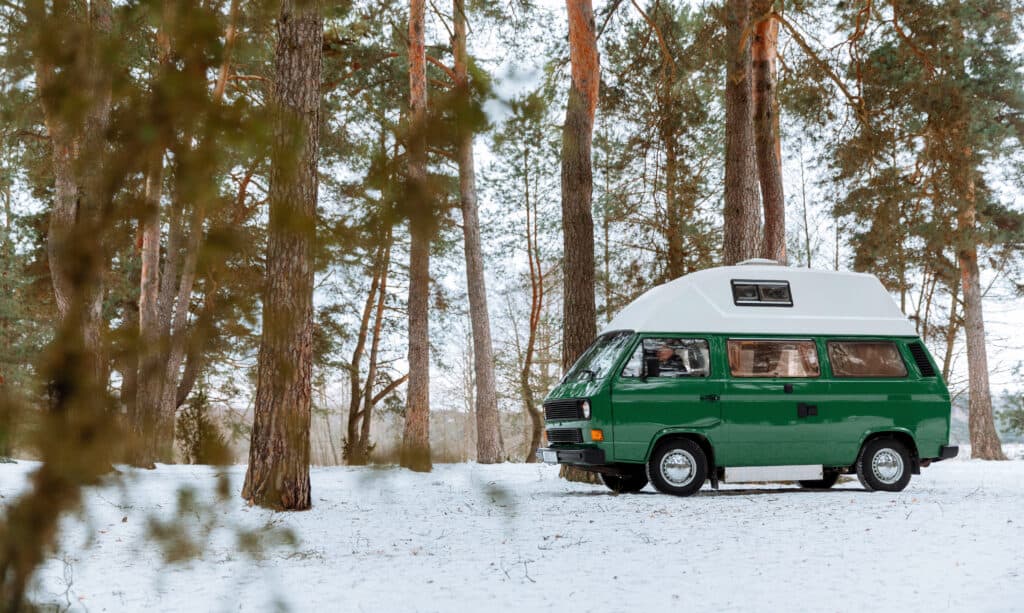
Beware of Condensation
Condensation can quickly become a problem in a confined space like a motorhome or camper. As the warm air cools down, it forms droplets. These are usually visible on windows as the glass is the coldest place in the vehicle. Condensation becomes more prevalent in colder weather as the warmth of the inside of the motorhome/campervan meets the cool air outside.
If condensation becomes excessive, it can result in damp forming. Mould and mildew spread quickly and in a motorhome or campervan it can appear on walls and window frames, as well as on upholstery.
Avoid Damp, mould and mildew
Keep it warm
To prevent the air in the motorhome/campervan from getting too cold, try leaving a small storage heater running. This will maintain a steady temperature, keep the air dry and prevent frost, condensation and dampness from forming. Many storage heaters even have a ‘frost’ setting for this exact purpose.
Make sure it’s insulated
When looking at preventing damp in your vehicle insulation is a key area to focus on. Make sure that any draughty areas are covered and that insulation materials are in good working order.
When your motorhome or campervan is not in use
Keeping your motorhome or campervan well-ventilated will allow air to flow freely. If you’re not using your vehicle over winter, turn off the fridge and leave the door open. Also, keep cupboard doors open.
Where possible, move any fabrics to the middle of the motorhome or camper, away from the windows. This will prevent cushions or other items from getting damaged by damp.
Winter Motorhome Clothing

Thermal Clothing
A good layering system is really important when you need to keep warm, whether you’re inside or outside your motorhome or campervan. Merino wool is the perfect choice, because it helps to keep your body temperature regulated, wicking away sweat so that you keep dry and don’t get a chill as your body temperature drops after physical activity. Merino wool is remarkably odour resistant too so that you don’t need to wash (or dry) your clothes as often; something that isn’t easily done in the middle of winter.
Waterproof Clothing
If you can keep dry on the outside this will help to keep you warm and cosy on the inside. A good quality waterproof breathable jacket and trousers are a must. Gortex or equivalent is recommended. For extra warmth, you may want to include a down or synthetic alternative layer beneath your outer shell to help retain your body heat.
Boots
Waterproof, comfortable and warm boots are a winter camping clothing essential. To really keep your feet dry, you can’t go wrong with a good pair of wellingtons. If you’re planning to explore on foot, walking boots and gaiters will keep your feet comfortable, warm and dry.
Gloves, hat and scarf
Around 30% of body heat is lost through the head. If it’s very cold outside a hat can be a real lifesaver. If the nighttime temperature dips in your vehicle when you’re in bed, a hat can keep you warm. Gloves and scarves are worth packing for that extra comfort too. With technology becoming a bigger part of our everyday lives whether it’s for navigation, photographs, or information, getting gloves that can work with touch screen devices is worth considering.
Get the right cover this Winter!
Be covered for whatever the weather might throw at you and get fully comprehensive cover for your motorhome or campervan. Get a quote today from a member of our friendly team on 0208 984 0777 or get a quote online!

